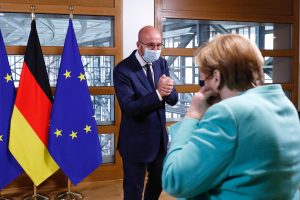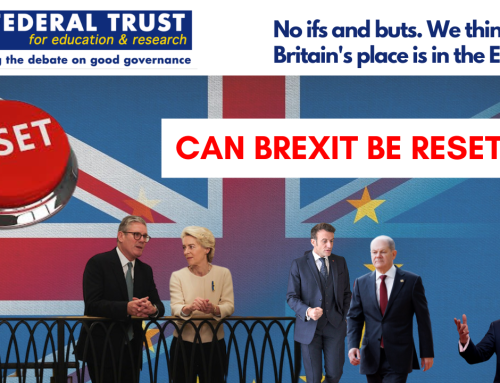
Charles Michel, President of the European Council; Angela Merkel, German Federal Chancellor on 8th July 2020. Copyright: European Union
“The EU was born out of catastrophe and has advanced through crisis,” wrote Martin Wolf, venerable economics commentator at the Financial Times, on June 2. It’s a common narrative thread through the last 60 years of EU history. Even today, faced with the worst pandemic in a century and the gravest economic crisis in 90 years, the word on the Place Luxembourg is: The EU will emerge stronger forged in crisis. Or, as a variant, “we’ll muddle through as always and come out stronger at the other end.” So, how far is this true?
Critics such as Wolfgang Münchau see the EU as just “limping along from crisis to crisis” – and that’s been the case in their eyes since at least 2008 and the financial crisis or even before. We had the Balkan civil war in the violent break-up of Yugoslavia where the EU was paralysed by inaction, not least because member states backed different sides: Germany/Croatia; UK/Serbia for instance. The aftermath of the 2008 banking crisis saw it morph into a sovereign debt crisis through bail-outs and then a fully-blown eurozone crisis, with the wrong neo-liberal macroeconomic decisions bringing a decade of austerity – the consequences of which we are still living with today.
Then, in 2015, we had the refugee crisis, as tens of thousands fled drought, famine, civil war in North Africa/the Middle East and further south – and saw Germany welcome a million but others refuse to lift a finger with external and, occasionally, internal borders closed when intra-EU solidarity and, far more, solidarity with refugees was required. A year later, of course, the UK as a whole voted narrowly in a deeply flawed referendum for Brexit, triggering some fears that other member states would follow suit. And all that in an atmosphere of heightened tension and dissension, especially over the rule of law in Poland and Hungary. And, as we know, these issues remain far from resolved even as we speak.
This past decade has seen the ugly face of populism, nativism, racism reborn in swaths of Europe. Partly, this has been a perhaps overdue reaction to the relentless march of untrammelled globalisation, leaving behind millions of resentful and angry losers in its economic wake – and a huge and growing inequality gap. But there has also been an evident democratic sovereignty deficit: people have simply felt rolled over by processes of change that governments have managed arbitrarily. And, all the while, a widespread feeling that Europe simply isn’t working – evidenced at the start of the pandemic by yet more border closures, refusals to share PPE or export urgently required medicines, above all by leaving Italy in the lurch as it struggled to cope with clusters of the coronavirus in towns and cities such as Bergamo.
But the picture we see before us now is quite different. Of course, there is continuing instability within the EU-27 but that’s inevitable: a mighty Germany that has managed the pandemic exceptionally well but faces enormous tasks in future (decaying infrastructure, obsolete industry sectors, failure to embrace digitalisation swiftly) and a politically divided, economically weakened Spain, say, or illiberal anti-democratic abuses of power by Viktor Orban, or, who knows, France at war with itself in the 2022 elections.
We are where we are but the EU is in better shape than it was: the threat posed by the Far Right has been contained, with the AfD in Germany down to 10% support, Salvini’s La Lega in Italy spluttering with impotent rage from the side lines and polls showing Marine LePen would lose again to Macron in 22 months’ time. The EU-27, despite the wildest fantasies of Johnson, Gove and Cummings, has more than survived their crude attempts to divide and rule; it has seen them off, displaying strong unity throughout the often nasty Brexit process. Generally speaking, the EU commands more popular support than before Brexit. And, critically, especially under two German women, Ursula von der Leyen and Angela Merkel, the EU is adopting measures driven by a renewed sense of solidarity when it comes to dealing with the pandemic as such and with its economic impact.
Germany took over the presidency of the EU council of ministers on July 1 and, in the run-up, signalled a change of course that should come to fruition at this week’s summit – the first scheduled face-to-face European Council for months. During lockdown and “de-hibernation” von der Leyen has been spearheading moves to co-ordinate EU responses to the pandemic: sharing PPE, above all, helping to set up the CV19 accelerator that is driving cross-country, cross-company R&D into new therapeutics, treatments and vaccines and pan-European efforts to procure and share equitably novel vaccines proven in clinical trials while winning regulatory approval in record time. The pandemic has spurred proposals for a €9.4bn stand-alone health fund cum health union to work on an EU-27 basis –with public health traditionally the preserve of national governments.
Brussels watchers always invest a lot of expectation in council presidencies when bigger countries take over but the new German one is raising even greater hopes than usual about outcomes over the next six months – not least because Merkel has nothing to lose: she’s standing down as Chancellor some time between now and next year’s elections. And, via a reboot of the old Franco-German locomotive of European integration – think de Gaulle/Adenauer, Schmidt/Giscard, Mitterrand/Kohl –, she and Macron have signalled a substantial change of course in EU economic thinking. This is the EU recovery plan or fund known as #NextGenerationEU that goes way beyond anything contemplated comparatively by the UK. This may not be the much-trumpeted Hamiltonian moment but it certainly gives the lie to the oft-proclaimed Minsky moment or market-led crash even though the Commission is now forecasting a 8.4% hit to EU GDP this year.
The von der Leyen fund now being negotiated by European Council President Charles Michel is worth €750bn or half as much again as the scheme first presented by Merkel and Macron earlier this year. The monies behind the fund will, for the first time, be raised by borrowing on the markets via the latest €1.074 trillion EU Budget or 7-year multiannual financial framework – also due to be approved this week or later in the summer. The breakthrough here is that Germany – which crushed debt mutualisation a decade ago – has conceded that new debt can not only be borrowed but done so on a shared or mutual basis. Debt repayments will take place much later. As Merkel has said, the EU has been met with the most difficult situation of its history – and exceptional times demand exceptional measures. Germany and not least Germans accept that it too will suffer if its neighbours are on their knees: Es lohnt sich Solidarität. The obsession with a balanced budget, the “black zero” or schwarze Null, has been (temporarily) laid to rest…despite the machinations of the German constitutional court.
Of course, there’s many a slip twixt cup and lip but it would appear that the package, subject to modalities negotiated between now and then, will win approval.
Some critics suggest that, as in 2012, the EU is over-reliant on the extraordinary measures undertaken by the European Central Bank. So far, in its special bond-buying programmes, the ECB has committed almost €1.5trn or a quarter of EU GDP. There are other support measures coming via the European Stability Mechanism. But what is different this time is that whereas, in the wake of the financial crisis, it was the ECB that undertook to “do whatever it takes” to save the euro and keep the EU show on the road, this time it’s the EU-27 and its leaders.
Finally, in a world dominated by the potentially and/or actually ruinous trade war and hegemonic battle between Trump’s America and Xi’s China, with Russia sniping from the sides, the EU is asserting a more values-based, shared sovereignty and solidarity globally. This contrasts with the Anglospheric delusions of Johnson et al. We’re here talking about de-carbonisation, green new deal, development aid but also of joint investments in goods and services as different as vaccines, lithium batteries, AI, electricity grids, pan-European rail networks, renewable energy. Or digital sovereignty, with the clear aim of taking on US/Chinese Big Tech both fiscally and industrially. Perhaps we’ll see tangible fruits at the postponed #COP26 in Glasgow next year.
Of course, none of this will be plain sailing. And the EU needs to go a lot further in terms of a fiscal union, with a European Monetary Fund or treasury, eurozone finance minister and longer-term debt-sharing, all within a more openly federal structure in which the European Parliament and national governments as well as devolved administrations assert greater democratic control. Not least over economic policy. Europe needs a much more evenly balanced economy, with the south no longer played off against the north etc…As Mario Centeno, the departing Eurogroup president, has said: “What is important on the fiscal front for Europe in the coming months and years is the way we engineer the process of return to the application of the fiscal rules in a way that avoids prompting a recession.”





